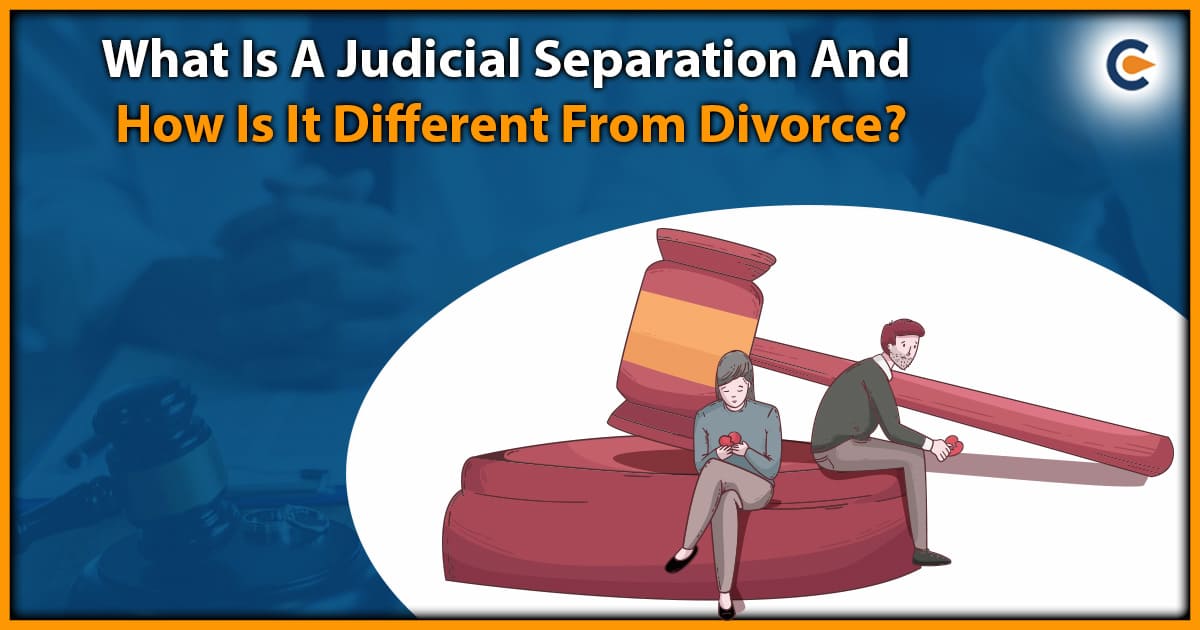A married couple can formally separate through the legal process of judicial separation by securing a court order. Contrary to divorce, it does not formally dissolve the marriage; instead, it permits the couple to live apart while still being legally wed. Legal seclusion can be either short-term or long-term, and in some cases, it can be the first phase of a divorce. If a couple decides to get divorced after a protracted separation, the decrees made during the judicial separation might be used as a starting point for negotiating the terms of the divorce settlement. In this article, the differences between a divorce and a judicial separation will be in-depthly discussed.
Meaning Of Judicial Separation
Judicial separation is a legal remedy available to married couples who want to separate but do not wish to obtain a divorce. It is a way for couples who are not ready for a divorce to live apart while still being legally married. In most legal systems, judicial separation is available as an alternative to divorce. It does not dissolve the marriage, as it allows the couple to live separately and make decisions regarding their finances, property, and children while still being legally married. This means that the couple can continue to enjoy certain legal benefits that come with marriage, such as inheritance rights, tax benefits, and social security benefits.
A court petition must normally be submitted as part of the procedure of getting a judicial separation. The grounds for requesting a judicial separation must be stated in the petition and may include adultery, cruelty, abandonment, mental illness, or other issues that make the couple’s ability to live together challenging. Additionally, the court has the authority to make decisions regarding the division of property and debts, child custody and visitation rights, as well as child support and spousal support.
The process and legal effects of judicial separation can vary depending on the specific legal system in question. For example, the Hindu Marriage Act, 1955[1] (HMA) provides for judicial separation under Section 10, which allows a spouse to approach the court and seek a decree of judicial separation on the grounds of adultery, cruelty, desertion, conversion to another religion, unsoundness of mind, etc. To obtain a decree of judicial separation under the HMA, A breakdown in the marriage and the lack of a realistic likelihood of reconciliation must be demonstrated to the court by the spouse who is seeking a separation. However, a judicial separation order does not end a marriage. and either spouse may later apply for a decree of divorce based on the same grounds that were used to obtain the decree of judicial separation.
Meaning Of Divorce
The legal dissolution of a marriage or other civil partnership is called a divorce. It is a procedure by which a married couple dissolves their union and releases themselves from the social and legal responsibilities of matrimony. As a result, the couple can get remarried or start a new marriage because they are no longer legally wedded. Divorce can have a wide range of implications on the parties involved, including serious emotional, monetary, and practical repercussions. Divorce may be a challenging and unpleasant process, especially if there are disagreements regarding property, children, or child support. Divorce, on the other hand, might be the best way to end a failing marriage for some couples.
A divorce involves a judge issuing a formal decision that ends the marriage and outlines the rights and obligations of the parties. Property splits, child custody and support decisions, and financial repercussions are some of the ramifications of divorce. The grounds for divorce can differ, but often involve irreconcilable differences, the breakdown of the marriage, or other problems that make the couple’s continued cohabitation difficult or impossible. The specific laws and procedures governing divorce can vary by jurisdiction but generally involve filing a petition with the court, serving the petition on the other spouse, engaging in negotiations or mediation, going to trial if necessary, and obtaining a final decree of divorce.
Difference Between Judicial Separation and Divorce
The major distinction between a judicial separation and a divorce is that the latter formally ends the marriage, whereas the former does not. Let’s go over the differences between the two in more detail.
| Basis of Differentiation | Judicial Separation | Divorce |
| Legal Status | Does not terminate the marriage, couple remains married. | Terminates the marriage, couple is no longer married. |
| Duration | Can be temporary or permanent, depending on the couple’s needs and desires. | It can only be permanent. |
| Grounds for Filing | Can be filed on similar grounds to divorce, such as adultery, cruelty, or abandonment. | Can be filed on similar grounds to judicial separation, but also often includes no-fault grounds. |
| Legal Process | Similar legal processes to divorce, including filing a petition, responding to a petition, and appearing in court. | Similar legal processes to judicial separation, but the court will issue a final decree of divorce. |
| Final Outcome | The court will issue an order that allows the couple to live apart and separate their finances, but they remain legally married. | The court will issue a final decree that formally ends the marriage, and may address issues related to property division, child custody, and support. |
| Remarriage | The couple remains legally married and cannot remarry without obtaining a divorce. | The parties are no longer married and are free to remarry. |
| Financial Arrangements | Couples are separated financially and may divide assets, but remain legally responsible for each other’s debts. | Financial arrangements are finalized and both parties are financially independent. |
Conclusion
In a judicial separation, the court grants permission for the couple to live apart and separate their finances while still maintaining their marital status. The couple is still legally wed and cannot remarry without first getting a divorce. On the other hand, in a divorce, the court issues a definitive divorce judgement that formally dissolves the marriage. The couple can be remarried or start a new marriage as their marriage is no longer recognised by the law. Another significant distinction between judicial separation and divorce is that the former is frequently undertaken as a stopgap remedy while the latter is a long-term fix. If a couple isn’t sure if they want to end their marriage, they might file for judicial separation. However, the pair will need to file for a divorce if they decide later that they wish to formally stop their marriage.
Read our Article:What Is Judicial Separation?











